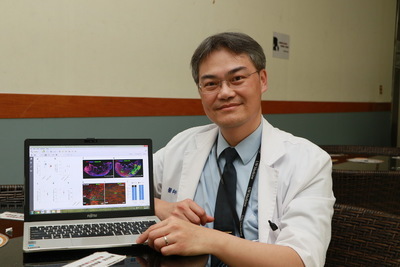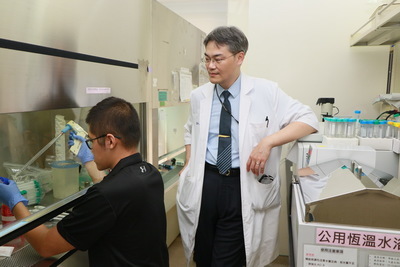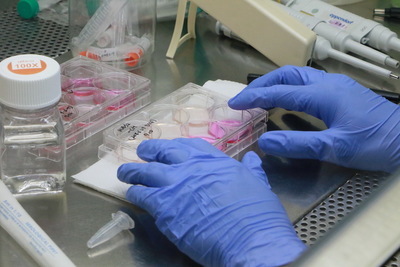NCKU’s Dr. Yen-wen Liu’s Research on Stem Cells and Regenerative Medicine Published in Nature Biotechnology



Dr. Yen-wen Liu is an associate professor of clinical medicine in the Department of Internal Medicine at National Cheng Kung University’s College of Medicine. Dr. Liu was formerly one of the researchers at Professor Charles Murry’s lab in the University of Washington’s Institute for Stem Cell and Regenerative Medicine. Dr. Liu worked together with a team of researchers in Murry’s lab to unlock the process of regeneration of cardiac muscle tissue in non-human primates. Following the induction of myocardial infarction (i.e., heart attack), the team implanted cardiac muscle cells derived from human embryonic stem cells into primates which successfully regenerated the damaged cardiac muscle tissue. This procedure restored severely damaged cardiac tissue and cardiac function. Their research was published in the internationally renowned scientific journal Nature Biotechnology.
Myocardial infarction causes necrosis (i.e., death of heart cells) and diminishes the heart’s regenerative capabilities which ultimately leads to one of the main mortalities of humans today—heart failure. Thus, understanding how to leverage stem cells to regenerate damaged heart cells and restore cardiac function have become an important research topic in the field of regenerative medicine. Dr. Liu, who the first-author among the co-authors of the published research, hopes to start clinical trials within the next couple of years.
Heart attacks rank among the top ten leading causes of death in the world. Thanks to the advances of modern medicine, the rates of heart failure and heart death have been drastically reducing. However, current medical technology still has its limitations. While existing techniques are able to reduce or prevent the residual effects of heart attacks or recurrences of acute cardiovascular diseases, there is yet to be a method for effectively regenerating damaged heart cells. Thus, heart failure resulting from myocardial infarction remains the main cause of death among those suffering from heart disease.
In 2012, this research team at the Institute for Stem Cell and Regenerative Medicine at the University of Washington began researching heart cell regeneration within non-human primates, specifically by using ‘pluripotent stem cells’. Many years ago, growing stem cells outside of the human body was proven to be a viable procedure. In this setting, stem cells can undergo mass cell differentiation and become heart cells. So, in 2013, having received a grant from NCKU and the recommendation of his faculty advisor in clinical medicine Dr. Patrick Ching-Ho Hsieh, Dr. Liu joined Professor Murry’s team in Washington State, USA, to continue his post-doctoral research.
Dr. Liu used cardiac catheterization to induce myocardial infarction and severe heart failure within the hearts of monkeys. Through cardiac NMR imaging of their hearts, he found that left ventricular ejection fraction (LVEF) (i.e., cardiac function) dropped from 65% to 40%. After implanting pluripotent stem cells that had been differentiated into cardiomyocytes (i.e., cardiac muscle cells), a significant portion of cardiac muscle tissue was regenerated within four weeks, resulting in recovering a third of the tissue damaged by myocardial infarction.
After significantly reducing the impact of myocardial infarction, cardiac function improved from 40% to 50%. Three months following stem cell implantation, cardiac function continued to improve, making Dr. Liu and his team members the first research team in the world to successfully mass implant heart cells derived from human embryonic stem cells into monkeys with myocardial infarction and effectively regenerate new cardiac muscle tissue. The results of this particular study were published in the multidisciplinary scientific journal Nature in 2014 in which Dr. Liu was one of the co-authors.
Although this procedure using stem cell treatments proved to be effective in regenerating cardiac muscle tissue, the research team later discovered that cardiac function did not improve with the regeneration. In fact, the regeneration had led to fatal arrhythmia. In their attempt to rectify this issue, Dr. Liu was then appointed the lead researcher. With his experience in clinical medicine, he was able ascertain the blind spots and shortcomings in the previous study design. Under Dr. Liu’s direction, the team redesigned the experimental methodology, including enlarging the area of the myocardial infarction-affected heart and increasing the degree of heart of failure. Under these new conditions, the implant of cardiac muscle tissue cells derived from pluripotent stem cells into the affected heart proved effective in reducing the risk of fatal arrhythmia.
Following the successful research led by Dr. Liu, he was asked by Prof. Murry to remain on the team and continue the research at the institute. Despite the very attractive offer from Prof. Murry, Dr. Liu ultimately decided to return to Taiwan after much deliberation, citing the following reasons: “I completed my studies in the department of medicine and my doctorate in clinical medicine at NCKU. I did my residency in internal medicine and received my cardiology training at National Cheng Kung University Hospital. I am where I am today because of NCKU. I credit a lot of my abilities and achievements because of the opportunities afforded to me by being at NCKU at the start of my research career.”
Filled with gratitude towards his alma mater and compelled by his sense of mission, Dr. Wen-Yen Liu hopes that his experiences abroad may now benefit those at NCKU. Though his profession demands much from him and has led him onto great things, it is his love for family and home that has brought him back to Taiwan.
Myocardial infarction causes necrosis (i.e., death of heart cells) and diminishes the heart’s regenerative capabilities which ultimately leads to one of the main mortalities of humans today—heart failure. Thus, understanding how to leverage stem cells to regenerate damaged heart cells and restore cardiac function have become an important research topic in the field of regenerative medicine. Dr. Liu, who the first-author among the co-authors of the published research, hopes to start clinical trials within the next couple of years.
Heart attacks rank among the top ten leading causes of death in the world. Thanks to the advances of modern medicine, the rates of heart failure and heart death have been drastically reducing. However, current medical technology still has its limitations. While existing techniques are able to reduce or prevent the residual effects of heart attacks or recurrences of acute cardiovascular diseases, there is yet to be a method for effectively regenerating damaged heart cells. Thus, heart failure resulting from myocardial infarction remains the main cause of death among those suffering from heart disease.
In 2012, this research team at the Institute for Stem Cell and Regenerative Medicine at the University of Washington began researching heart cell regeneration within non-human primates, specifically by using ‘pluripotent stem cells’. Many years ago, growing stem cells outside of the human body was proven to be a viable procedure. In this setting, stem cells can undergo mass cell differentiation and become heart cells. So, in 2013, having received a grant from NCKU and the recommendation of his faculty advisor in clinical medicine Dr. Patrick Ching-Ho Hsieh, Dr. Liu joined Professor Murry’s team in Washington State, USA, to continue his post-doctoral research.
Dr. Liu used cardiac catheterization to induce myocardial infarction and severe heart failure within the hearts of monkeys. Through cardiac NMR imaging of their hearts, he found that left ventricular ejection fraction (LVEF) (i.e., cardiac function) dropped from 65% to 40%. After implanting pluripotent stem cells that had been differentiated into cardiomyocytes (i.e., cardiac muscle cells), a significant portion of cardiac muscle tissue was regenerated within four weeks, resulting in recovering a third of the tissue damaged by myocardial infarction.
After significantly reducing the impact of myocardial infarction, cardiac function improved from 40% to 50%. Three months following stem cell implantation, cardiac function continued to improve, making Dr. Liu and his team members the first research team in the world to successfully mass implant heart cells derived from human embryonic stem cells into monkeys with myocardial infarction and effectively regenerate new cardiac muscle tissue. The results of this particular study were published in the multidisciplinary scientific journal Nature in 2014 in which Dr. Liu was one of the co-authors.
Although this procedure using stem cell treatments proved to be effective in regenerating cardiac muscle tissue, the research team later discovered that cardiac function did not improve with the regeneration. In fact, the regeneration had led to fatal arrhythmia. In their attempt to rectify this issue, Dr. Liu was then appointed the lead researcher. With his experience in clinical medicine, he was able ascertain the blind spots and shortcomings in the previous study design. Under Dr. Liu’s direction, the team redesigned the experimental methodology, including enlarging the area of the myocardial infarction-affected heart and increasing the degree of heart of failure. Under these new conditions, the implant of cardiac muscle tissue cells derived from pluripotent stem cells into the affected heart proved effective in reducing the risk of fatal arrhythmia.
Following the successful research led by Dr. Liu, he was asked by Prof. Murry to remain on the team and continue the research at the institute. Despite the very attractive offer from Prof. Murry, Dr. Liu ultimately decided to return to Taiwan after much deliberation, citing the following reasons: “I completed my studies in the department of medicine and my doctorate in clinical medicine at NCKU. I did my residency in internal medicine and received my cardiology training at National Cheng Kung University Hospital. I am where I am today because of NCKU. I credit a lot of my abilities and achievements because of the opportunities afforded to me by being at NCKU at the start of my research career.”
Filled with gratitude towards his alma mater and compelled by his sense of mission, Dr. Wen-Yen Liu hopes that his experiences abroad may now benefit those at NCKU. Though his profession demands much from him and has led him onto great things, it is his love for family and home that has brought him back to Taiwan.
Provider:
news center
Date:
2018-07-30